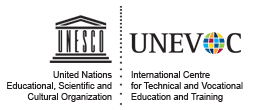Education and training central in climate change agreements
Please activate JavaScript
14-15 November, 2016
Marrakesh, Morocco
The 22nd Conference of Parties (COP22![]() ) organized by the United Nations Framework Convention on Climate Change (UNFCCC
) organized by the United Nations Framework Convention on Climate Change (UNFCCC![]() ) in Marrakesh, Morocco, reaffirmed Member States’ commitment to the COP 21 Paris Agreement. They were urged to build on the momentum generated in Paris, and to strive for the attainment of the Sustainable Development Goals
) in Marrakesh, Morocco, reaffirmed Member States’ commitment to the COP 21 Paris Agreement. They were urged to build on the momentum generated in Paris, and to strive for the attainment of the Sustainable Development Goals![]() . UNESCO, UNESCO-UNEVOC and partners contributed to the discourse that meant to highlight concrete actions to implement Article 6 of the agreement, including the need to invest in skills development for a sustainable future.
. UNESCO, UNESCO-UNEVOC and partners contributed to the discourse that meant to highlight concrete actions to implement Article 6 of the agreement, including the need to invest in skills development for a sustainable future.
Education and training are paramount in driving countries’ transitions towards sustainable development. A joint discussion on the 14th of November organized by UNESCO and UNESCO-UNEVOC prompted participants to consider the key building blocks of a coordinated policy approach for enhancing skills that will aid the transition towards green growth and employment. The session was moderated by Borhene Chakroun, Chief of UNESCO Youth, Literacy and Skills Section. Burkina Faso Princess Abzeita Djigma represented the Mama Light Initiative and panellists from UNESCO-UNEVOC, CIRADD Canada![]() and the International Labour Organization (ILO
and the International Labour Organization (ILO![]() ) successfully raised awareness on the importance of developing policy solutions that support local-, institutional- and community level actions. The public discussion also triggered interest in highlighting the need for financing skills development and involvement of the private sector.
) successfully raised awareness on the importance of developing policy solutions that support local-, institutional- and community level actions. The public discussion also triggered interest in highlighting the need for financing skills development and involvement of the private sector.
 |
Panel discussion at COP22 |
UNEVOC Network in action
On the 15th of November, UNESCO-UNEVOC and seven of its UNEVOC Network![]() members discussed the obstacles and solutions to overcome challenges they had encountered while implementing greening curriculum and training in their respective TVET institutions. Many initiatives were driven by an urgent need to improve youth’s employability by adapting institutional curricula and training to labour market requirements and to respond faster and more adequately to increasing demand for technological competencies. Examples were shared of initiatives that developed skills for community-based, youth-oriented green enterprises. Additional factors that had given participants the impetus to implement initiatives included the need to make operations of campuses more cost-efficient and to impact their communities.
members discussed the obstacles and solutions to overcome challenges they had encountered while implementing greening curriculum and training in their respective TVET institutions. Many initiatives were driven by an urgent need to improve youth’s employability by adapting institutional curricula and training to labour market requirements and to respond faster and more adequately to increasing demand for technological competencies. Examples were shared of initiatives that developed skills for community-based, youth-oriented green enterprises. Additional factors that had given participants the impetus to implement initiatives included the need to make operations of campuses more cost-efficient and to impact their communities.
The following UNEVOC Centres participated in the session:
- Seychelles Institute of Technology
 (Seychelles)
(Seychelles) - Hong Kong UNEVOC Centre – Centre for Lifelong Learning
 (Hong Kong)
(Hong Kong) - Omnia
 (Finland)
(Finland) - CETVETAR, University of Nsukka
 (Nigeria)
(Nigeria) - iHub
 (Ukraine)
(Ukraine) - ENSET Rabat
 (Morocco)
(Morocco) - CIRADD (member of CICan
 , Canada)
, Canada) - HITI
 (Lebanon)
(Lebanon) - Ministry of Education
 (Algeria)
(Algeria) - ENSIT
 (Tunisia)
(Tunisia) - CSET
 (Mauritiana); and
(Mauritiana); and - Other institutions affiliated to UNEVOC centres.
Greening TVET for sustainability
Greening TVET is a response to pressing global issues with regard to sustainable development. Climate change, scarcity of resources and global citizenship are some of the factors that drive the transition into a green-oriented growth. TVET must respond to these challenges through the provision of green skills for new and existing jobs, as well as the greening of TVET institutions through a whole-institutional approach.
For more information, please visit our webpage on greening TVET![]() .
.
